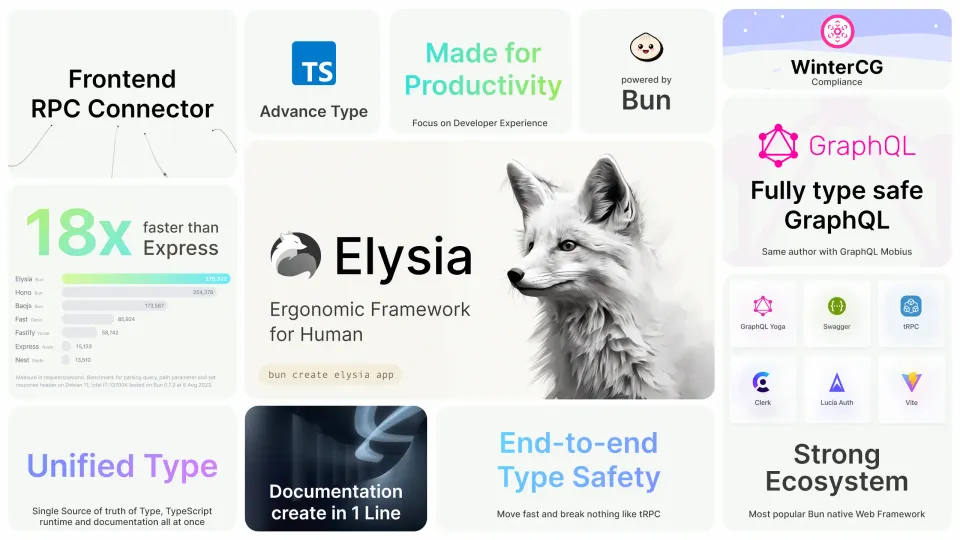Bun | ElysiaJS

A Deep Dive into the Ergonomic TypeScript Framework
Elysia is a rising star in the world of web frameworks, captivating developers with its focus on ergonomics, lightning-fast performance, and unwavering commitment to type safety. Built on top of Bun, Elysia leverages its powerful foundation to deliver an exceptional development experience. In this comprehensive exploration, we'll delve into the intricacies of Elysia, uncovering its strengths, design philosophies, and the reasons behind its growing popularity.
Unveiling the Core Principles: Ergonomics and Type Safety
Elysia prioritizes developer experience, aiming to streamline workflows and minimize cognitive load. Its ergonomic design shines through in various aspects, such as:
- Intuitive Syntax: syntax is designed to be natural and easy to read, reducing the mental overhead associated with complex frameworks.
- Automatic Type Inference: The framework intelligently infers types, saving you time and effort from manual annotations.
- Unified Type System: boasts a unified type system, ensuring consistency and eliminating potential type-related errors.
- Built-in Type Validation: Strict type validation is embedded within the framework, catching type mismatches early in the development process.
Furthermore, unwavering commitment to type safety sets it apart. By leveraging TypeScript's end-to-end type checking, Elysia guarantees code correctness, reduces runtime errors, and improves overall code maintainability. This type safety extends not only to your application logic but also to external APIs and databases, providing a robust foundation for reliable applications.
Performance Prowess: Bun at the Core
Exceptional performance stems from its solid foundation on Bun, a high-performance JavaScript runtime environment. Bun offers significant speed advantages over traditional Node.js, making Elysia applications lightning-fast and responsive. This performance boost translates to a smoother user experience, faster development cycles, and improved scalability.

Beyond the Basics: A Feature-Rich Framework
Goes beyond just ergonomics and performance, offering a comprehensive set of features to empower developers:
- Automatic Documentation Generation: Generate comprehensive API documentation directly from your code, saving you time and effort.
- OpenAPI 3.0 Specification Generation: Simplify API development with automatic generation of OpenAPI 3.0 specifications.
- Built-in Testing Utilities: Streamline your testing process with built-in testing utilities that seamlessly integrate with your development workflow.
- Active Community: boasts an active and supportive community, providing valuable resources, tutorials, and assistance.
Simple HTTP Server with Elysia
This example demonstrates a basic HTTP server built:
import { Elysia, t } from 'elysia'
import { swagger } from '@elysiajs/swagger'
new Elysia()
.use(swagger())
.get('/id/:id', ({ params: { id } }) => id, {
params: t.Object({
id: t.Numeric()
})
})
.listen(3000)
Explanation:
- We import the
Elysiaclass from the library. - We create an instance of the
Elysiaclass, representing our server application. - We define an HTTP GET route for the root path (
/) using theapp.get()method. The provided arrow function will be executed when a GET request arrives at the root path. - We use the
app.listen()method to start the server on port 3000. - Finally, we log a message confirming the server is running.
Building upon this example:
- You can define additional routes for different paths and HTTP methods (GET, POST, PUT, etc.).
- You can access route parameters in your response function using the provided context object.
- You can integrate with databases, templating engines, and other frameworks.
Running the example:
- Save the code in a file named
server.ts. - Install the
elysiapackage:npm install elysia - Run the server:
bun run server.ts
This will start the server and you can access it in your browser by visiting http://localhost:3000/.
Remember: This is a basic example. Elysia offers various features like middleware, error handling, and data validation to build more complex and robust applications.

Member discussion